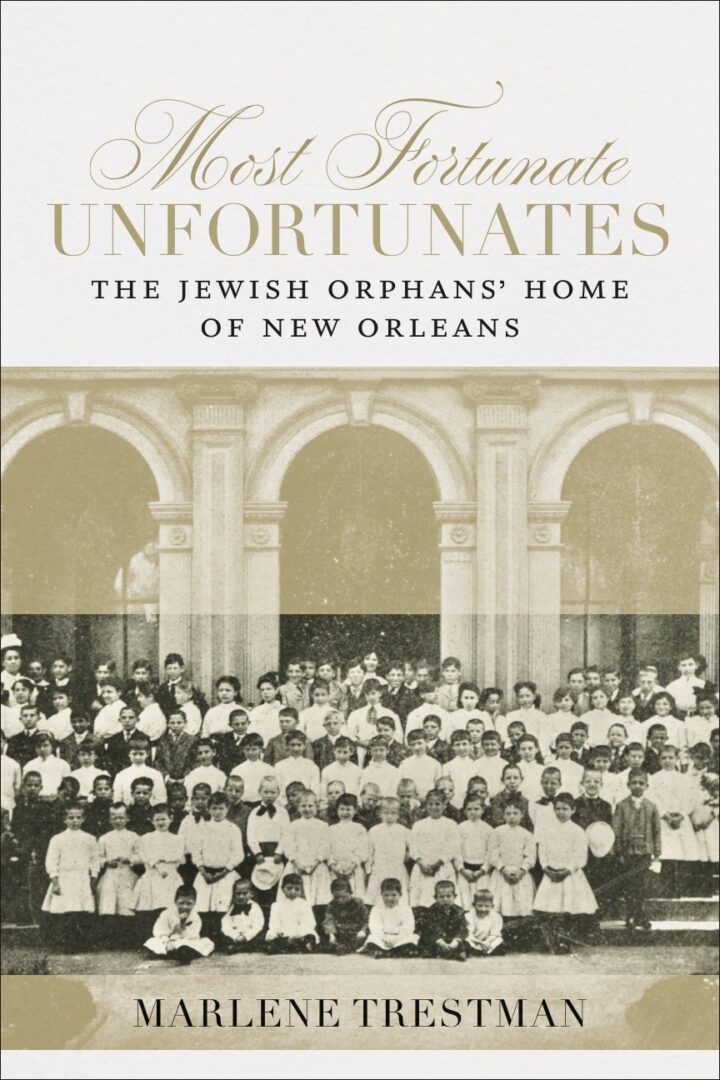Praise for Most Fortunate Unfortunates
“In her evocative account, Trestman recovers a part of New Orleans’ vibrant history and the Jewish community’s determination to care for its needy through its orphans at what was declared to be a ‘Magnificent Monument to Hebrew Benevolence.’ Through her deep archival research and nearly 150 interviews, Trestman provides essential context to her narrative as she charts the evolving principles of childcare over the decades with nuance and insight.”
Trestman has written an “exhaustively researched yet readable and fascinating account of the founding of a Jewish orphanage. . . . Though unfortunate in lacking the security of a home with family, those who lived among the boys and girls and caring staff of the Jewish Orphans Home of New Orleans were indeed fortunate.”
“Most Fortunate Unfortunates is that rarest of scholarly achievements: an incredibly detailed and impressively researched institutional history that reads with ease, gaining and keeping the reacher’s interest with its flawless writing style and numerous humanizing vignettes. . . . With narrative empathy and scholarly rigor, Trestman gives readers insight into not only one specific orphanage, but into the larger challenges, triumphs, and dilemmas of an American Jewish community determined to care for its children.”
–Kim van Alkemade, New York Times bestselling author of Orphan #8
“Attentive to race and gender, and contextualized within general and Jewish history as well as the history of child care, Most Fortunate Unfortunates sets a new standard as a well-researched, well-written, warts-and-all history of the Jewish Orphans’ Home of New Orleans.”
–Jonathan D. Sarna, University Professor and Joseph H. & Belle R. Braun Professor of American Jewish History, Brandeis University
“In this comprehensive and engaging study of a pioneering Jewish orphanage in the United States, Trestman highlights distinctive features of the institution’s history — yellow fever, founders who enslaved, and leaders who fled rather than pledge allegiance to the Union — arising from its location in New Orleans.”
–Reena Sigman Friedman, Ph.D., author of These Are Our Children: Jewish Orphanages in the United States, 1880-1925
“Marlene Trestman’s Most Fortunate Unfortunates provides a well-scoped, well-written, carefully documented and extensively researched window into institutional childcare in America over nearly a hundred years, with emphasis on Jewish services. The focus is a renowned New Orleans institution, originally called the Home for Jewish Widows and Orphans.”
–Peter M. Wolf, author of The Sugar King: Leon Godchaux, A New Orleans Legend, His Creole Slave, and His Jewish Roots
“This well-documented, nuanced, and highly readable account of the Jewish Orphans’ Home is much more than the story of a single institution. It provides a fascinating window onto New Orleans history, while also offering a revealing look at issues of race, class, gender, and the Jewish experience from before the Civil War to after World War II.”
–Deborah R. Weiner, co-author of On Middle Ground: A History of the Jews of Baltimore
In her “comprehensive and engaging study … of this influential institution … Marlene Trestman approaches her subject with passionate interest born of her own experience.” [Read full review here]

“What’s remarkable about Marlene Trestman’s Most Fortunate Unfortunates is its ability to shift scope, from the intricate details of local institutional history–complete with names, faces, personalities, and incidents hitherto forgotten–up to regional, national, and even international contexts. Marvelous research, amazing story–or rather stories–with broader significance, all emanating from New Orleans.”
—Prof. Richard Campanella, historical geographer and author, Tulane University
“Marlene Trestman beautifully molds her extensive research into an outstanding history of the Jewish Orphans’ Home of New Orleans. Changing institutional policies come alive through the children’s stories. Most Fortunate Unfortunates belongs on the reading list of everyone interested in childcare and education, and Southern and American Jewish and general history. This fine volume earns my highest recommendation.”
–Mark K. Bauman, Editor, Southern Jewish History
“Marlene Trestman is a meticulous researcher and engaging storyteller who spins narratives about youngsters who benefited from their years at the Jewish Orphans’ Home, often following their lives from the day each became a “Home kid” until graduating into the wide world beyond. More than 140 interviews and oral histories augment this enlightening institutional history that follows the emergence of professional social workers and explores still-evolving childcare standards.”
–Hollace Ava Weiner, editor of Lone Stars of David: The Jews of Texas and author of Jewish Stars in Texas: Rabbis and Their Work
“Marlene Trestman has written an outstanding study of the Home for Jewish Widows and Orphans, located in New Orleans. Aptly entitled ‘Most Fortunate Unfortunates,’ this book successfully navigates the perils of tedious institutional history and, on the other hand, unfettered personal accounts. What emerges is a readable history that adds to our understanding of Jewish practices and philanthropy, the city of New Orleans, and changing views on insitutional child care. Additionally, given her exhaustive research into the Home, Trestman gives readers a sense of what it was like to one of the ‘fortunate unfortunates.'”
“In the first comprehensive, scholarly history of the Jewish Orphans’ Home of New Orleans, Marlene Trestman … persuasively documents how the Home offered its beneficiaries a social safety net upward mobility, and a path to self-sufficiency…. Trestman’s engaging account is accessible for a range of audiences.” [Read full review here]
